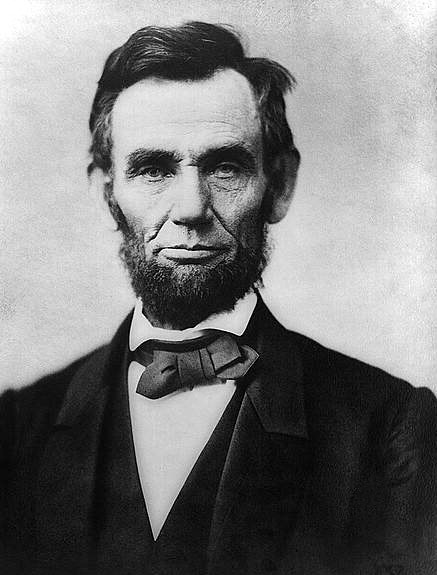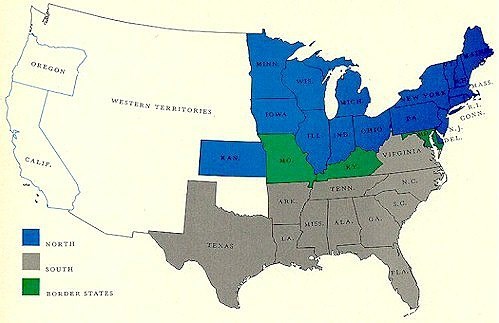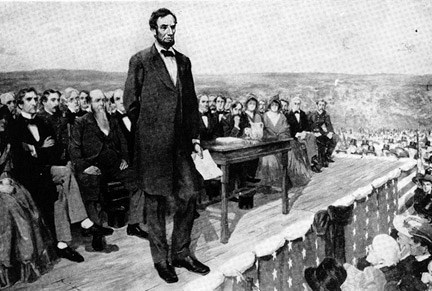 |
| Abraham Lincoln (February 1809-April 1865) (Google Images) |
X-ray vision and super strength characterize a hero in movies. However, true heroes act with the intention of benefiting others rather than themselves. All actions of a hero are noble and selfless.
One word describes Abraham Lincoln’s early days: misery. Born in a small log house in Kentucky, luxury was seemingly impossible to attain. His ambitions for education and significance in society were forcibly buried under his father’s will for him to be a farmer. In order to survive, he had to chop wood; success dwindled down to only a dream. The most education he received as a boy was during infrequent attendance at a log cabin schoolhouse, with books barely within his reach. As if that wasn’t enough, he lost three family members during his childhood. However, despite his impossible circumstances and background, he rose to the presidency and made choices that changed American history forever. Sixteenth President of America, successful leader during the American Civil War, and Great Emancipator, all define Abraham Lincoln. But deeper within his worldly titles and stovepipe hat rests the wisdom and selflessness of a true hero.
 |
| Union and Confederacy of the time |
Abraham Lincoln was a man of many achievements. He made his public debut during the famous Lincoln-Douglas debates in which he expressed his opposition against slavery. As the years progressed, Lincoln gained respect from citizens. In 1861, he rose to executive power as a Republican, soon strategically leading the nation in the bloodiest war in American history. A natural speechwriter and inspirational speaker, he “spurred on his people” (Holzer) through arduous circumstances. Because of his leadership, the Union and Confederacy became one united nation. On top of that, liberated slaves and hardworking abolitionists praised Lincoln as he published the Emancipation Proclamation. After the war, the proclamation was sealed with the Thirteenth Amendment which “had the beneficial effect of adding a moral aspect to the Union cause” (DISCovering Biography). Lincoln’s politic guidance brought a ray of hope to the healing nation.
His success was only made possible due to his careful choices and wisdom. “In conducting a bitter war, Lincoln never became bitter himself. He showed a nobility of character that had worldwide appeal” (Holzer). Not expressing bitterness in public was wise, because it made his people hopeful for a good outcome; this allowed the citizens to feel secure, limiting inner turmoil. A wise person will remain calm, even during the worst circumstances in order to maintain peace. “The war brought out his best qualities, as he rose to each new challenge. Lincoln was a master politician, and he timed his actions to the people’s moods. He led by persuasion” (Holzer). He had clever plans with which he carefully led the people. He never forced anything and still succeeded in being the head of a nation. As if not to arouse his devastated people, he judged according to their favor. His choices and actions brought out his wisdom.
 |
| President Lincoln giving his Gettysburg Address (Google Images) |
Despite his spectacular achievements, Abraham Lincoln never failed to be selfless. After the Union victory, “Lincoln delivered his famous second inaugural address, urging a gentle hand toward southerners in the postwar world” (Holzer). After a tedious war due to rebellious people, anyone in his shoes would want a form of chastisement upon the rebels. But instead of pursuing a possible desire to punish, he did what he could to preserve the Union. His generosity prevented the nation from splitting and restored peace between the enemies. He served the nation even though he was in the most respected position as President. A true hero knows to selflessly lower himself for the good of others.
Although it seemed impossible for the poor farmer to blossom, he conquered all to become the nation’s hero. Even over a century since his death, he continues to inspire citizens all over the globe. In his “Gettysburg Address”, Lincoln said “and that government of the people, by the people, for the people, shall not perish from the Earth.” He reminds people of the basic principle upon which the nation was established. The speech advises posterity to let the people have a say in their government. As long as the people are happy, the country will remain strong. Also, in his “House Divided” speech, Abraham Lincoln proclaimed, “A house divided against itself cannot stand.” A house is where a family lives, caring and encouraging each other through thick and thin. A nation should be as such. If a nation truly is a family, no conflict should stand. He provided the core values for which a nation should strive.
Although Abraham Lincoln had no physical “supernatural” powers, he used ultimate wisdom and humility to deliver a whole nation from a grave crisis. Spiderman and Batman may have saved a city or two, but Lincoln saved America.
Page created on 10/20/2010 12:00:00 AM
Last edited 1/6/2017 9:53:22 PM
